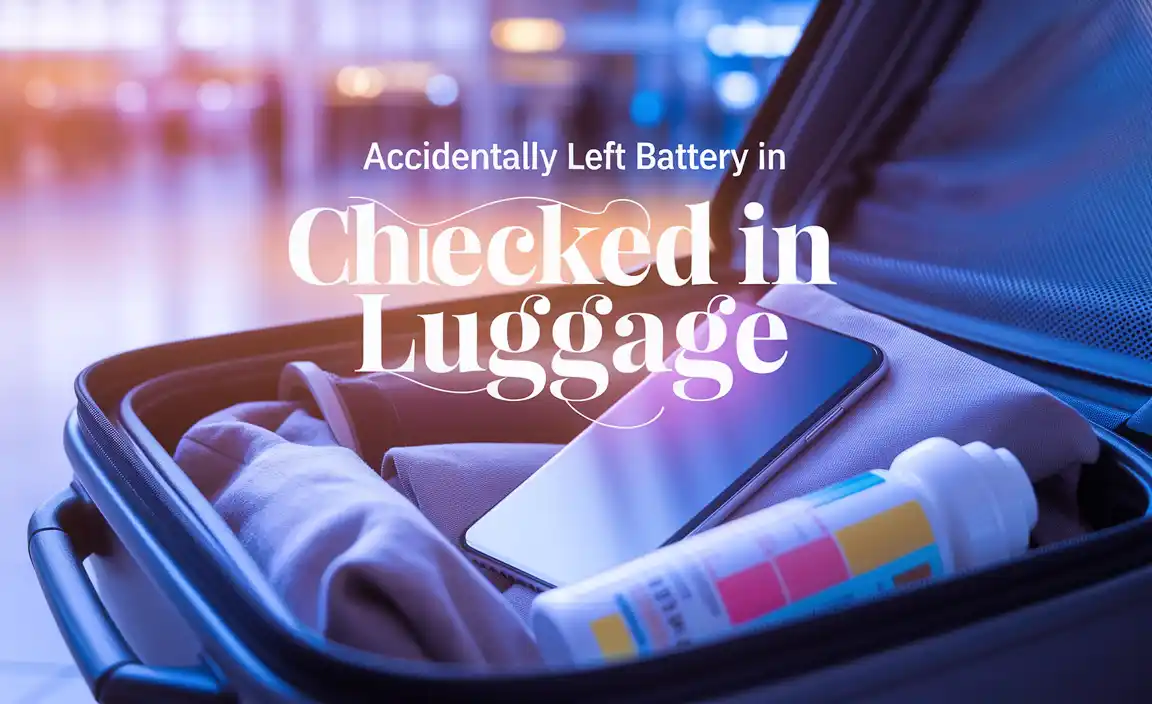Wondering what can happen if you accidentally left battery in checked in luggage? This can pose potential risks and lead to complications during security screening. It is crucial to follow guidelines and regulations to ensure a smooth and stress-free travel experience.
Leaving a battery pack in checked baggage can pose a serious risk due to the IATA dangerous goods regulations. To prevent this, passengers should be aware of the guidelines from the Federal Aviation Administration and airlines like British Airways regarding dangerous goods. It’s advisable always to carry electronic devices and battery packs in hand baggage to ensure safety and compliance with regulations.

Why Can’t You Leave Batteries In Checked Luggage?
- Batteries can pose a fire risk due to their potential to short-circuit or overheat.
- They can leak, leading to corrosive damage to luggage, cargo holds, and other items.
- In-flight fires caused by batteries are harder to detect and extinguish in the cargo hold.
- Batteries are risky materials and need handling carefully to prevent accidents.
- Airlines and regulatory bodies limit the carriage of batteries in checked luggage to minimize safety risks.
Lithium Batteries Can Catch Fire
One rule is that the luggage can not contain any flammable items. Because the cargo cabin for luggage storage is a pressurized room, any luggage with flammable objects by chance may react with pressure and explode. Due to the fire risk, airlines do not allow lithium batteries in checked luggage. Lithium-ion batteries have been famous for catching fire if damaged or short-circuited.
This risk multiplies when you pack batteries tightly with other items in checked luggage. There is a greater chance of happening damage to them during handling. To ensure the safety precautions of passengers and crew, airlines prohibit the transportation of lithium batteries/spare lithium batteries from checked baggage to put in carry-on baggage, where we can easily monitor them.
Information On The Prohibited And Allowed Type Of Batteries
The authorities prohibit certain lithium batteries from being in checked luggage due to the risk of fire or explosion. Passengers can bring lithium ion batteries as carry-on baggage, but prohibited ones are loose lithium metal batteries.
You can bring Lithium-ion batteries with installed lithium content on board. But loose lithium batteries have no permit. Passengers need to be mindful of the restrictions on lithium metal batteries to ensure safety during air travel.
However, the TSA generally permits carrying small lithium polymer-ion batteries (less than 100 watt-hours) in carry-on luggage. Other types of batteries, such as spillable and rechargeable batteries, such as alkaline or nickel-metal hydride batteries, have prohibition issues.
The Following Consequences If You’ve Already Packed A Battery
- Nickel cadmium batteries are not prohibited in checked luggage
- Spillable batteries are allowed in checked luggage
- The restrictions are mainly for lithium batteries
- Lithium batteries have amp hour ratings
- Accidentally leaving a battery in luggage can be dangerous
- Accidental activation of batteries can also pose risks
If the security screening process discovers a battery, you will likely receive a fine and may face additional consequences. Depending on the airline’s policy, fines can range from minor monetary charges to more serious disciplinary action, such as being banned from future flights. It is important to always check the airline regulations before packing to ensure compliance and avoid any potential penalties.
Handle The Situation If You Accidentally Left Battery In Checked In Luggage
This situation can be very dangerous. Terrorists might also use them to fulfill their grievous actions. Well, that’s a very big problem now! If it gets in the hold of the TSA or Transport Security Administration, they will seize all the luggage and send legal notice to the owner of the luggage.
Again, even if it somehow escapes the eyes of the TSA, then the owner might be free from a legal notice, but the whole plane he is traveling in will be at risk of catching fire.
What Should You Do To Resolve This Problem?
If you accidentally left a battery in your checked luggage, you should inform the airline staff immediately. They may require you to remove the battery and carry it in the cabin. It is important to follow airport regulations to avoid any safety risks. Always double-check your luggage to ensure compliance with airline policies and prevent any potential issues during your journey.
How Do You Know If Something Has A Lithium Battery?
- You can check the product’s specifications or manual
- Look for labels indicating the presence of a lithium battery
- Some devices may have a battery icon or warning symbol
- The item may mention lithium battery usage in its description or packaging
The best way to know if something has an installed lithium battery may vary depending on the item in question. However, some general tips that may help you determine whether or not something has a lithium metal battery include checking to see if the battery is removable, looking for markings that indicate the battery type, and checking to see if the battery is certified by a safety agency.
Suppose you forgot portable chargers and electronics that use secondary lithium-loose batteries in your check-in bag. There is a chance that they could be damaged if they are not returned to the owner.
Follow These Battery Safety Tips When Traveling With Batteries
Different airlines may have specific rules regarding batteries in checked-in luggage. It is essential to review the guidelines provided by your airline before packing your bags. As a general rule, passengers should ideally pack batteries in carry-on luggage rather than checked-in bags. This allows for easier accessibility and reduces the risk of damage or loss.
If possible, remove batteries from electronic devices before packing them. This reduces the risk of accidental activation or damage to the device during transportation. To prevent short circuits or unintentional activation, ensure you store batteries in their original packaging or separate plastic bags.
Conclusion
Checked-in luggage is a very sensitive matter in the case of a plane journey. The TSA may charge a fine of around $360 to $2090 for the discovery of any prohibited items in the luggage. Therefore, one has to be very vigilant from the start to avoid any disruption.
To stay safe, expensive, dangerous items, important documents, jewellery, and obviously flammable objects should never be put in checked-in luggage. If you do accidentally leave a battery in your checked luggage, it is important to notify TSA immediately and follow their instructions. We can all contribute to a safer and smoother travel experience by working together.
FAQ
[rank_math_rich_snippet id=”s-a71114e6-ff14-4550-9e5b-b5f68da4fd43″]








